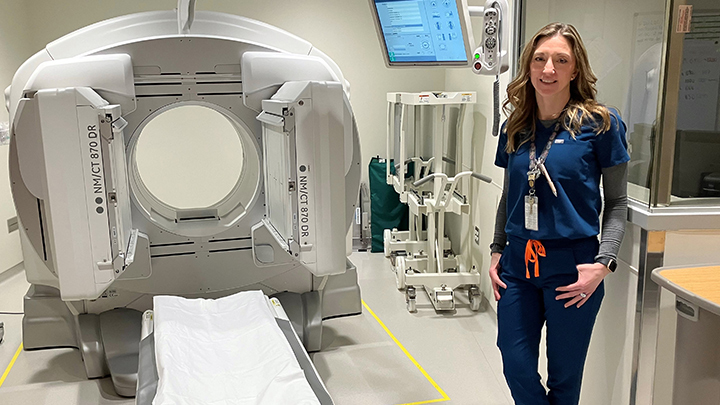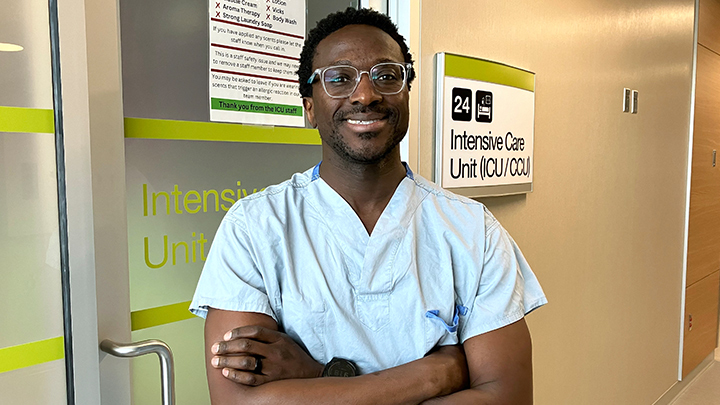
April 19, 2024

Senior nuclear medicine technologist Kari Monsen stands next to a CT scanner in Grande Prairie Regional Hospital. Photo by Sara Blake.

“As a regional site, we are trying all the time to see if we can optimize the care that we provide, and that includes towards the end of life … making that difficult time less stressful,” says Grande Prairie SEND physician Dr. Tafirenyika Madzimure.Photo by Sara Blake.
Story by Su-Ling Goh | Photos by Sara Blake
GRANDE PRAIRIE — A heart-wrenching process for families who want to donate their loved one’s organs and tissues has been made easier, thanks to teamwork and a new imaging protocol at the Grande Prairie Regional Hospital.
Until recently, potential donor patients in the Grande Prairie intensive care unit (ICU) had to be transported to the University of Alberta Hospital in Edmonton for imaging to assess their neurological activity. If the scan confirmed brain death and they were eligible to donate organs and/or tissues, they could stay in Edmonton to donate. If not, the patients were considered for transport back to Grande Prairie.
This process took at least two days and proved difficult for patients’ families during an already dark time in their lives.
“It’s quite distressful for the family,” says Dr. Tafirenyika Madzimure, a Grande Prairie SEND physician. (SEND stands for Specialist in End-of-Life Care, Neuroprognostication and Donation.)
“They go through the grief and the loss at the beginning, and you broach the subject of a donation and they sometimes find it helpful that something good is going to come out of (their loved one’s death). But there’s that time delay and the logistics of travelling … and the time spent where they don’t know whether what they’re hoping for will happen.
“So some patients and families would end up wanting to stop (the donation process) … and they’d say it’s probably best for their loved one to pass away closer to home.”
To make it easier on families, Madzimure approached radiologist Dr. Keith Lemay and senior nuclear medicine technologist Kari Monsen to see if brain scans could be done in Grande Prairie.
“Dr. Madzimure did a wonderful job explaining to me the opportunity that this opens up for northern Albertan families — and (avoids) the lost opportunity of organ donation that’s currently happening, just with the logistics of getting a patient from here to the city to have this test done,” says Monsen.
Monsen reached out to the radiopharmacy in Edmonton and realized it was possible to follow the University of Alberta’s protocol. Her team ordered the radioactive supplies and learned how to store and use them.
“It’s definitely a learning curve and there’s a lot of responsibility with the outcome of this exam — so it’s something the staff here is not taking lightly,” adds Monsen.
The radiology team expects to scan about two to four potential donor patients per year. Madzimure appreciates their “progressive culture”.
“They didn’t say, ‘No we can’t.’ They were able to say, ‘You know what — we can look at it.’”
He adds that the need for brain death assessment in Grande Prairie has never been higher. The hospital’s ICU capacity recently increased, more patients are being admitted to intensive care here and Bill 205 — ‘mandatory referral’ legislation — means his team is required to approach more families about organ and tissue donation. Having the service up north also reduces the pressure on Edmonton ICUs.
Monsen says she’s glad the new initiative will help save transplant-recipient lives, and expects some emotional moments for her team.
“It’s going to be hard, to be honest, because we haven’t been exposed to patients like this in nuclear medicine,” says Monsen. “So it’s definitely going to be emotional, but the outcome will be hugely beneficial.”
Madzimure adds: “As a regional site, we are trying all the time to see if we can optimize the care that we provide, and that includes towards the end of life … making that difficult time less stressful.”
For more information on organ and tissue donation, visit GiveLifeAlberta.ca.